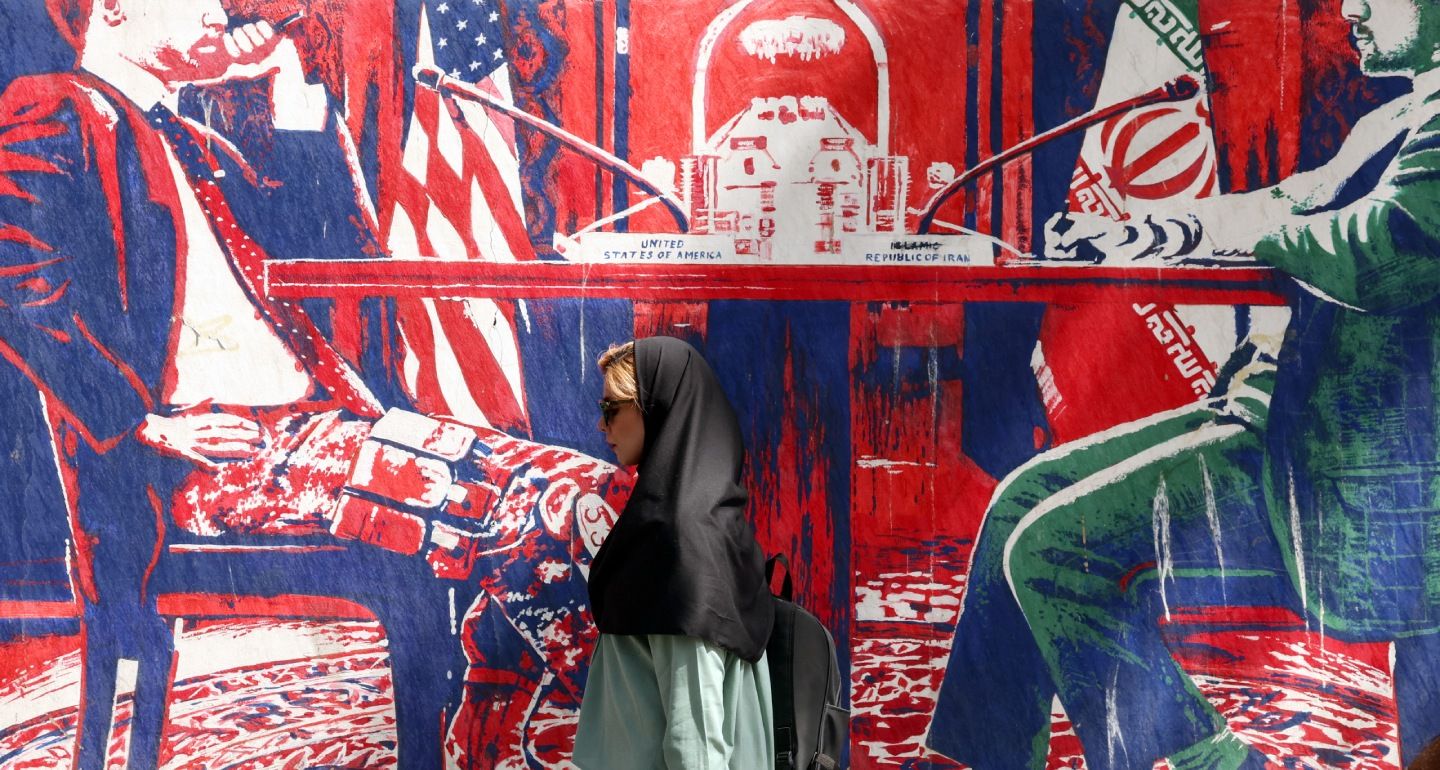What should happen when sanctions designed to weaken the Belarusian regime end up enriching and strengthening the Kremlin?
Denis Kishinevsky
{
"authors": [
"Nikita Smagin"
],
"type": "commentary",
"blog": "Carnegie Politika",
"centerAffiliationAll": "",
"centers": [
"Carnegie Endowment for International Peace",
"Carnegie Russia Eurasia Center"
],
"englishNewsletterAll": "",
"nonEnglishNewsletterAll": "",
"primaryCenter": "Carnegie Russia Eurasia Center",
"programAffiliation": "",
"programs": [],
"projects": [],
"regions": [
"Russia",
"Iran",
"United States",
"Middle East"
],
"topics": [
"Foreign Policy",
"Nuclear Policy",
"Security",
"Global Governance"
]
}
Moscow isn’t exactly thrilled by the prospect of sanctions against Iran being lifted, but if a new Iranian nuclear deal is inevitable, then the Kremlin is prepared to play an active role in it.
U.S. President Donald Trump may have torn up the previous nuclear deal between the United States and Iran during his first term in office, but he now seems serious about signing a new one. Washington has not only held several rounds of talks with the Iranians, but also dropped many of its demands.
That confronts Russia—which, united by a shared conflict with the West, has grown closer to Iran—with a dilemma: sabotage the negotiations in order to keep its ally isolated by sanctions, or try to become an important mediator in the agreement, as it was in the previous deal.
Back in 2017, Trump not only withdrew unilaterally from the agreement and imposed a slew of sanctions on Iran, but also made maximalist demands for a return to negotiations. The Iranians were asked to abandon both their nuclear enrichment and their missile program, and to cease all support for their proxy forces in the region. In the end, Tehran did not even make it to the negotiating table, despite the damage to the economy caused by the return of intensified sanctions.
However, that policy of putting maximum pressure on Iran failed, and now Trump is adopting a completely different position. Nothing if not extremely pragmatic, the U.S. president is trying to conclude as many deals as possible in the shortest space of time. That has already led to Washington entering into agreements with the Houthis in Yemen, and to unexpected steps to normalize relations with the new Syrian government. Another consequence of this pragmatism was the cooling of Trump’s relations with Israeli Prime Minister Benjamin Netanyahu.
Compared with the previous demands, Trump’s present requirements vis-à-vis Iran are far more modest. According to leaks, the current talks are focused exclusively on the nuclear program, with no attempts to incorporate other regional security issues. Ideally, the deal should ensure that Iran will never be able to possess nuclear weapons, and in exchange, the United States will lift sanctions, which is theoretically possible given the Republican majority in both houses of Congress.
The main problem with the talks is that the two countries have very different ideas about how to ensure that the other side keeps its end of the bargain. Tehran says it should retain the right to enrich uranium, but is willing to reduce the level of enrichment and allow observers to verify that.
One working scenario could be allowing enrichment up to 4 percent under international monitoring. Tehran had agreed to that under the previous deal struck with U.S. President Barack Obama. But now the United States is insisting that Iran stop enrichment completely, and import fuel for its nuclear power plants instead.
Tehran has said outright that fully halting enrichment is an unacceptable term, but negotiations are ongoing, which means that Washington may yet make new concessions. Especially since the situation is currently in Iran’s favor: the Iranians have not only managed to draw Trump into negotiations, but also to push back the threat of a military response to the Iranian nuclear problem thanks to the cooling of ties between the United States and Israel. Although, of course, the talks may still collapse, given the fickle nature of the current American administration.
For Russia, the unexpectedly dynamic negotiations between Washington and Tehran pose something of a dilemma. Overall, the lifting of sanctions against Iran is not in the Kremlin’s interests. The current situation, in which Iran is being forced to strengthen its relationship with Russia due to being isolated from the West, suits Moscow very well. It makes Iran a reliable partner, since Tehran’s lack of concern over Russian sanctions makes it possible to enter into long-term projects with it. But if Iran’s sanctions are lifted, Tehran’s position may change.
Then there is the prospect of additional volumes of Iranian oil entering global markets: one that has always worried the Russian side, which views Iran as a major competitor on the world hydrocarbon market. A new nuclear deal between Iran and the United States, therefore, is not the best scenario for the Kremlin.
At the same time, the outright failure of the negotiations would also be dangerous, since the United States could in that case return to a military scenario. Air strikes would inevitably destabilize Iran, running the risk of the country’s disintegration. That would leave Russia with an influx of refugees and possibly a civil war on its doorstep, quite apart from the fact that it would bury numerous Russian projects in Iran, in which Moscow has been actively investing in recent years.
The ideal scenario for Russia, therefore, would be for negotiations between Tehran and Washington to go on endlessly without yielding any concrete result. In a sense, that is what is happening now, but the situation could swing one way or another at any time.
Even if Russia wanted to sabotage any deal between Iran and the United States, it has little power to influence the negotiating process. If Washington and Tehran reach an agreement, it will be impossible to do anything about it. So if a deal looks inevitable, the Kremlin will most likely try to position itself as an important participant in it to gain leverage over the process, just as it did in the previous agreement under Obama.
Right now, both Iran and the United States have a vested interest in Russia’s involvement. Tehran needs intermediaries to increase the chances of the agreement’s implementation and to exclude the possibility of Trump or his successor withdrawing from it again a few years down the line. It is in Iran’s interests, therefore, to involve as many parties as possible in the deal: the International Atomic Energy Agency, China, Russia, and also the UAE and Saudi Arabia.
Tehran also needs intermediaries as sources of observers. If the only other party in the deal is the Americans, they will have to be given access to monitor Iranian nuclear facilities.
The United States, for its part, needs Russia’s participation to help with certain technical issues. In the last deal, it was Russia that agreed to accept spent nuclear fuel from Iran—something the other participants were not prepared to do. A similar situation is possible now.
Iran will have to dispose of the enriched uranium somehow, and Russia appears to be seen as the frontrunner for this task. First, it has the technical capabilities to receive and process it. Second, this is Tehran’s preferred option. After all, should the United States withdraw from the deal again, Iran should be able to get the enriched uranium back from Russia without too much difficulty.
For the Kremlin, that would be an acceptable compromise. Despite all the costs that an end to sanctions against Iran would entail for Russia, making Moscow into an indispensable mediator between Tehran and Washington would give it a sense that it had escaped its isolation. It would also give the Russian side real leverage over U.S.-Iranian relations. Ultimately, however, endless and fruitless negotiations would still be preferable for Russia, avoiding both the prospect of a military attack on Iran and of sanctions being lifted.
Carnegie does not take institutional positions on public policy issues; the views represented herein are those of the author(s) and do not necessarily reflect the views of Carnegie, its staff, or its trustees.
What should happen when sanctions designed to weaken the Belarusian regime end up enriching and strengthening the Kremlin?

Denis Kishinevsky
The supposed threats from China and Russia pose far less of a danger to both Greenland and the Arctic than the prospect of an unscrupulous takeover of the island.

Andrei Dagaev
Western negotiators often believe territory is just a bargaining chip when it comes to peace in Ukraine, but Putin is obsessed with empire-building.

Andrey Pertsev
Unexpectedly, Trump’s America appears to have replaced Putin’s Russia’s as the world’s biggest disruptor.

Alexander Baunov
Baku may allow radical nationalists to publicly discuss “reunification” with Azeri Iranians, but the president and key officials prefer not to comment publicly on the protests in Iran.

Bashir Kitachaev